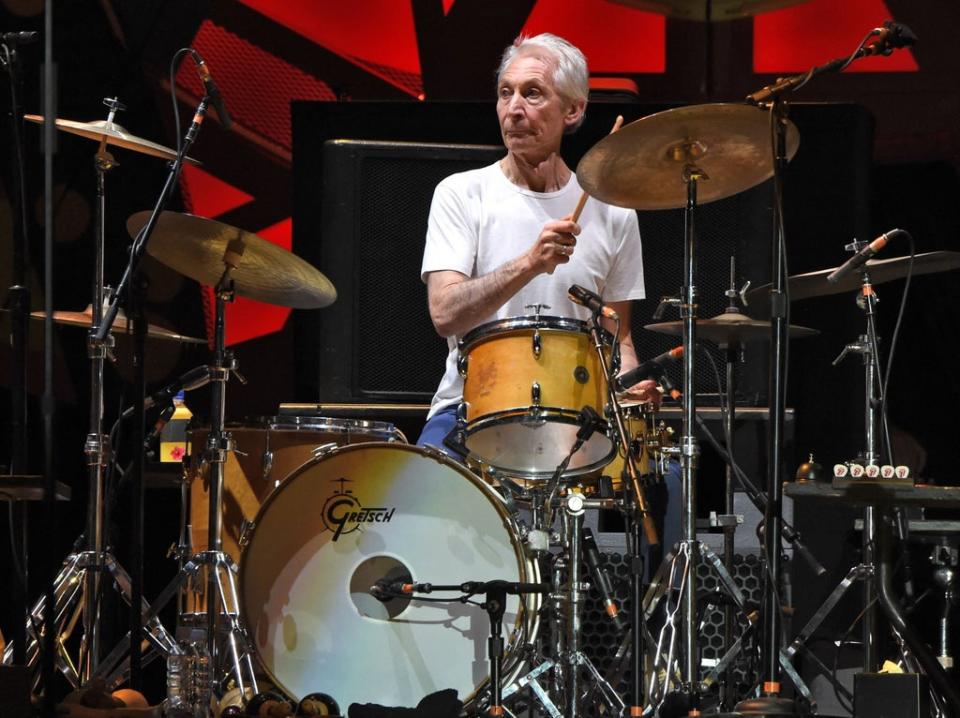Charlie Watts, the drummer of the greatest rock’n’roll band who didn’t much care for rock’n’roll
In recent years at the end of a Rolling Stones gig, when it was the moment to name-check the band, Mick and Keith would turn round to the morose-looking man behind the drum kit, and Jagger would yell “Char-Lee-Watts!” Then he and Keith would both prostrate themselves on the floor before the chap, whose hang-dog expression showed a man oblivious to the praise.
But from Mick and Keith, it was acknowledgement, perhaps belated acknowledgement, that Watts was the rock on which their sound was built.
Charlie Watts is the biggest anomaly in rock history: the drummer of the greatest rock band in the world who didn’t much care for rock’n’roll. When pressed in the early days to name a rock’n’roll hero, he could only come up with Fats Domino. He quickly added that his real heroes were Charlie Parker and Miles Davis.
Charlie Watts was a jazzman, initially reluctant to join Brian Jones and Mick Jagger’s new band in 1963, but was somewhat attracted by their bluesy approach (his previous two bands had been blues bands). He still thought of them as an “interval” band. But they were impressed by his extensive wardrobe, if puzzled by his day job in an advertising agency and the fact that he still lived at home with his parents. On stage, the dapper drummer described as being “immaculately dressed and barbered”, presented a contrast with the studiedly rebellious attitude of his bandmates. What also stood out was the complete lack of emotion he was to show on stage for the next half century. And there was reason for that detachment. Charlie never fully understood why he was seated behind The Rolling Stones at some stadium rather than a genuine jazz outfit in a smoky Soho dive.
The love of his early years was American jazz from the swing and bebop eras, and he could bring swing to the Stones, propelled by a clean, uncomplicated backbeat.
More than that, though, he could take the lead where necessary. Watch him in concert on 1969’s massive hit “Honky Tonk Women”. Before Keith’s hypnotic guitar is Charlie setting the atmosphere on a cowbell with his following, arresting drum riff, invariably getting the crowd dancing, and forming everlasting memories.
One Stones concert I attended opened to everyone’s surprise with just Mick and Charlie on stage for their very early hit “Not Fade Away”. At first, it was just Charlie, his driving beat finally forcing Mick to retaliate with those still snarling vocals. For that minute or so, it seemed they didn’t need anyone else to join them. The jazzman could always be the supreme rock drummer if that was what was demanded.

In the Sixties, Charlie had a persona, long, actually, before Keith developed his now familiar persona. Charlie, unsmiling, almost bored looking, drew the audience’s gaze, because he was so unlike the rest of the band.
And he was unlike other rock stars of the era. For a start, he was happily married. One memorable statistic in bassist Bill Wyman’s autobiography was (tediously) how many girls each member of the band had slept with. The numbers varied, but only Charlie had a zero next to his name.
When the exhibition about the Stones’ career opened at the Saatchi gallery in 2016, I experienced the persona myself. One room showed some of the Stones’ more outlandish fashions: the multicoloured, circus-like costumes from the hippy era. Frankly, they didn’t really suit any of the Stones. They certainly didn’t suit Charlie. I looked at them with him. “Do you remember those, Charlie?” I asked. “The riposte came in his best Eeyoreish tone. “I remember them. I didn’t always like them.”
He was Eeyore, too, whenever a new tour was announced. Charlie was detached. Mick once said to me: “Charlie always makes out that he is dragged kicking and screaming on tour. But if he didn’t want to come, he wouldn’t come.” And it’s true: some of that bored persona was for effect.
It wasn’t until the late Seventies that Charlie succumbed to one of the worst rock star habits: heroin. And it was Keith who literally pulled him off the floor and told him to pull himself together. Perhaps it was the gobsmacking irony that made Charlie focus and rediscover his old self. But it was never quite his old self. For years regarded as part of the second division of the band, with nothing able to break through his patience and stoicism, he snapped, memorably in 1984. Mick had telephoned him to attend a band meeting, saying, perhaps jokingly, “Where’s my drummer?”
Charlie entered the room, picked Mick up and punched him in the face. “Don’t ever call me ‘your’ drummer again,” he said, “You’re my f***ing singer.” He exited the room, returning after a few minutes, to hit his singer again.
Charlie’s death will hit Mick and Keith very, very hard. Sure, The Rolling Stones will continue, eventually, to tour, and under the band’s name. Only the loss of Mick or Keith would change that. But they know it will never be quite the same. It’s not just that their bandmate of 58 years has gone. Gone too is the glue that bound them together.

 Yahoo News
Yahoo News 
